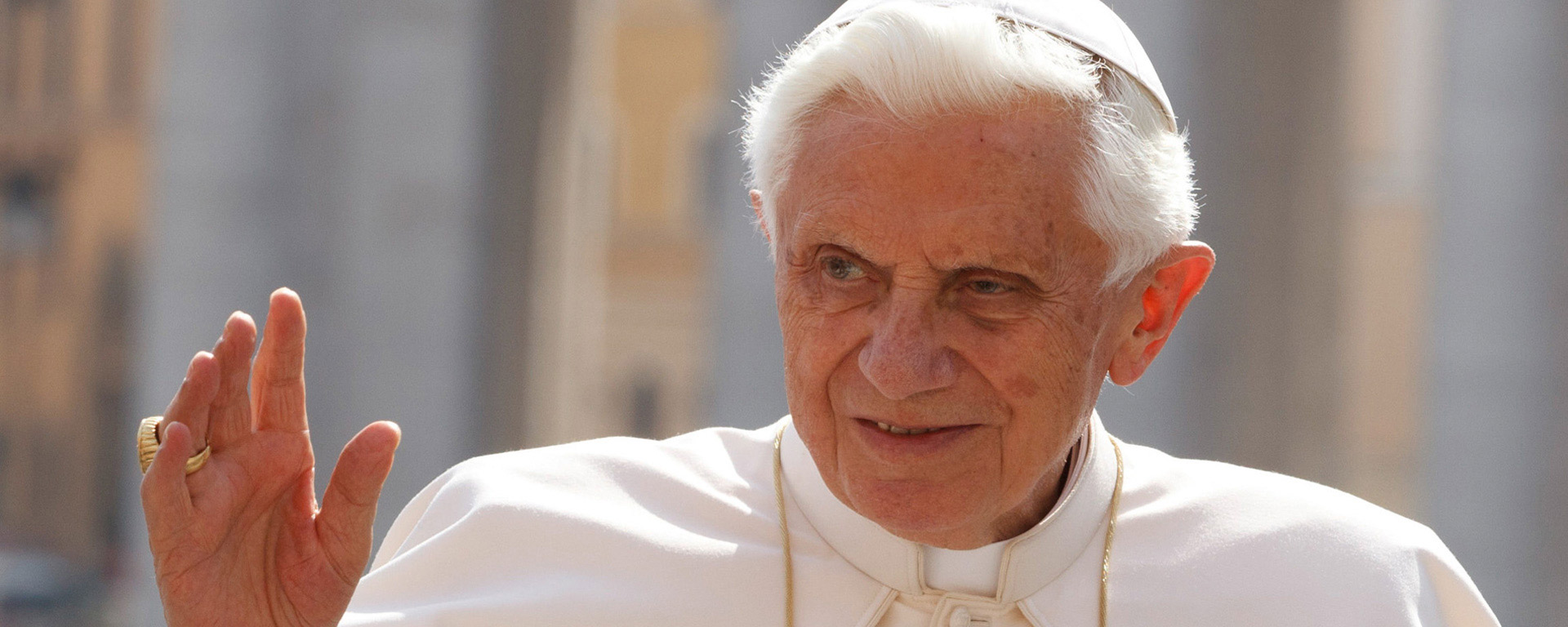
Pope Benedict XVI
The resignation of Pope Benedict XVI is a good thing for the Catholic Church. For the second time in history* a pontiff has voluntarily given up the chief administrative office of the largest Christian denomination¹. The move has shocked most Roman Catholics who are used to the Holy Father being in charge until he passed away.
benedict
Benedict’s resignation will cement the idea that the Pope, is not a once in a life special person, but rather an administrator or representative like the Archbishop of Canterbury is for the Anglican Communion or the various other leaders of churches are for their flocks.
ratzinger
Most Roman Catholics do not know that officially Jesus is the head of the Holy Roman Catholic and Apostolic Church. The Pope, from Papa or Holy Father, is the Vicar of Christ; his chief priest. If you asked most people, Catholic or not who the head of the Catholic Church was, they would say the Pope.
german pope
 The Bishop of Rome, which the Pope is, is considered to be the successor to the office of Saint Peter.
The Bishop of Rome, which the Pope is, is considered to be the successor to the office of Saint Peter.
Peter, or Simon bar Jonah (Simon Johnson) was among the first disciples chosen by Jesus. He was a fisherman from Galilee in Roman ran Palestine. The four canonical gospels (there are others) clearly point to Peter having primacy amongst the twelve apostles. He is told in Matthew’s gospel that he is the rock upon which Jesus will build his church [Matt 16:18-19], this quote is in 10 feet high letters around the drum of St. Peter’s Dome in the Vatican.
Not only that, Peter would be given the keys to the Kingdom of Heaven; this is why you always see him at the pearly gates and depicted in paintings with keys. Finally Peter will have the ability to make laws for humanity, “whatever you bind on earth shall be bound in heaven, whatever is loosened on earth shall be loosened in heaven”.
why did the pope resign
This is quite a claim. The role of James the Just, the brother, step-brother or half brother of Jesus, has been deliberately downplayed by the Church over the years – if Jesus had a brother(s and sisters) the doctrine of Mary’s Perpetual Virginity goes out the window.
The Gospel of John, the fourth Gospel, mentions Jesus having brothers and sisters and the writings of Josephus, a Jewish chronicler who worked for the Romans, mentions James the Just as being the brother of Jesus who some in Jerusalem believed to be the Messiah.
pope benedict xvi health
As a result of the special powers that Peter is given from Jesus, the Catholic Church is at pains to show they succeed him; that there is an unbroken line of Popes going back through history to Peter.
Equally some other Christian denominations claim that Jesus was talking about himself and not Peter, however if you look at the passage in the Bible, this doesn’t make any sense. The key point is whether or not this power was restricted to Peter himself or was this the institution of an office that others could occupy.
In other words do the successors of Peter have the right to make laws for humanity? Is there meant to be a Holy Father or Pope at all or is every man his own priest?
why did pope benedict resign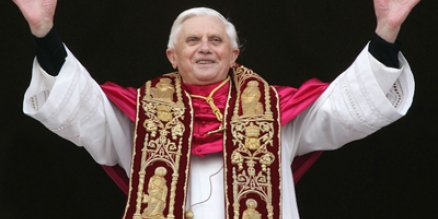 The Catholic Church officially says that their popes are successors to the office he established on Rome.
The Catholic Church officially says that their popes are successors to the office he established on Rome.
The problem is that there is no real evidence that Peter ever visited Rome. The last mention of Peter in the New Testament says he left Jerusalem and “went somewhere else”. Not particularly specific. Peter’s letters in the New Testament, which may not have been written by him, attest to him being in Babylon. Peter may have been in actual Babylon; he was preaching in that region previously, or he may have been using Babylon as a euphemism for Rome.
Rome was considered the new den of iniquity as Babylon had been six hundred years previously when the Jews were forced to live there. Later tradition records Peter as being in Rome and it would certainly make sense for him to be there.
why did pope benedict retire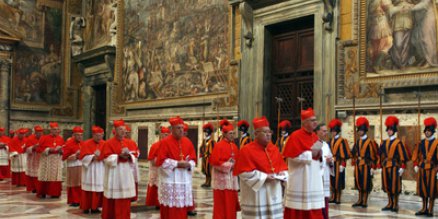 After the execution of Jesus, Peter along with Jesus’ brother James assumed a dominant role in the church.
After the execution of Jesus, Peter along with Jesus’ brother James assumed a dominant role in the church.
James (the Just) remains in Jerusalem and Peter travels east to Antioch in Syria, which initially had the largest group of Christians. Peter is regarded as the first Bishop (from episcopus or overseer) of Antioch. Most Christians, and Catholics in particular, do not know that Jesus had brothers and sisters; that is to say that Mary and Joseph had children. They did according to biblical sources. Whether or not these people were siblings or only half siblings of Jesus is a matter of belief.
In the Gospel of John, which was written somewhere around 100 AD, Jesus told Peter that he would “stretch out his arms” or be crucified and taken somewhere “where he did not want to go”. This may reflect information at that time that Peter had been crucified as had many of the Apostles following the Great Persecution of Christians launched by Nero in the 60s AD.
Tradition from the third century records that Peter was crucified upside down on Vatican Hill in the circus or chariot racing track of Gaius. The Roman Emperor Gaius or Caligula built a racing track on the hill in the 40s AD and it was improved upon by Nero twenty years later. Apparently Peter chose to be crucified upside down as he did felt he was unworthy to emulate Christ. Roman executioners were also known to delight in torturing their prisoners so they would have been only too happy to grant this sixty year old man his last request.
After his execution Peter was buried in a simple grave in a nearby cemetery with the simple inscription Petros Eni, Greek for “Peter lies within”. The current Saint Peter’s Basilica in Rome is built right over this cemetery and in the very middle, directly beneath the altar is apparently the grave of the prime apostle.
benedict xvi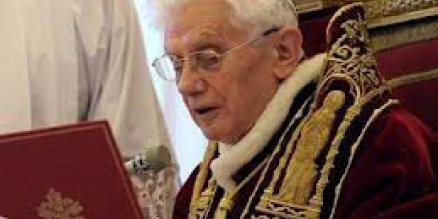 The problem with this analysis is that there is no contemporary evidence for it, which is the case for much of history. The accounts, primarily Tertullian’s ca, 225, are from almost 200 years after the event and Peter’s bones have not been tested to the satisfaction of modern science. The bones in that grave may belong to a man who walked with Jesus or they may not.
The problem with this analysis is that there is no contemporary evidence for it, which is the case for much of history. The accounts, primarily Tertullian’s ca, 225, are from almost 200 years after the event and Peter’s bones have not been tested to the satisfaction of modern science. The bones in that grave may belong to a man who walked with Jesus or they may not.
It certainly makes sense for Peter to have been in Rome; he was the head of the Apostles and Rome was the capital of the Roman Empire. The Liber Pontificalis, or Book of the Popes, again from much later on, trace a line of Popes right back to Peter to show a link in authority, a passing on of the baton to a new leader. The walls of the Sistine Chapel, often ignored by visitors, depict the first 32 Popes in chronological order from Peter to Sylvester I who was the Bishop of Rome when the Roman Emperor Constantine converted to Christianity. Interestingly the sixth Pope was called Sixtus or Latin for Sixth.
Most historians agree that it was with the reign of Leo I in the fifth century that the Bishop of Rome claimed the authority to rule the entire church. Competing Sees, or Bishoply seats of power, included Constantinople (there Constantine had relocated the Empire’s capital in the fourth century) alongside Antioch in Syria, Alexandria in Egypt and Jerusalem in the Holy Land.
A large part of this sanctimoniousness was due to the belief that Peter himself had established the see of Rome and his successors had authority from Christ himself to make laws for humanity. Therefore other sees were irrelevant. Constantinople itself broke with Rome in the 11th century in the Great Schism creating Roman Catholic Western Europe and Orthodox Eastern Europe. The Second Ecumenical Council of Lyon claimed Rome had “supreme and full authority over the universal church”.
Martin Luther would dispute this in the early sixteenth century by breaking with Rome and effectively creating a Protestant Northern Europe and a Catholic Southern Europe. The official position of the Catholic Church, until the Vatican II council in 1963, was Extra Ecclesiam Nulla Salus or that anyone outside the Catholic Church could not be saved, an update of Unam Sanctam from Boniface VIII.
pope benedict xvi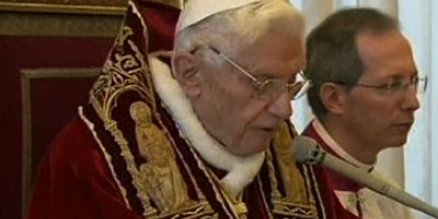 How does all this historicising relate to Benedict’s resignation? Firstly, it establishes the idea that the Holy Father was not chosen by God or is not a successor to the office of Peter. If a previous pope is alive while another reigns, is the new Pope actually a proper Pope? Does he have the authority of the office or is his predecessor actually still God’s anointed? Was the election valid? Is the election only for a period of time? Why were most Popes the Pope for life and why wasn’t this one? Is Pope Benedict XVI the real Pope and not Francis?
How does all this historicising relate to Benedict’s resignation? Firstly, it establishes the idea that the Holy Father was not chosen by God or is not a successor to the office of Peter. If a previous pope is alive while another reigns, is the new Pope actually a proper Pope? Does he have the authority of the office or is his predecessor actually still God’s anointed? Was the election valid? Is the election only for a period of time? Why were most Popes the Pope for life and why wasn’t this one? Is Pope Benedict XVI the real Pope and not Francis?
Again the claim to succeed the office of Peter, replete with the power given to him by Jesus, is a claim which cannot be proven. If it is true, one Pope cannot be a proper Pope if his predecessor is alive. There is not an unbroken line of Popes from the current one, back to Peter. Even reading the official Book of Popes issued by the Church reveals this. The line has been broken many times and has had many disreputable characters hold the office. Therefore the Pope does not have special powers; he is merely the administrative head of the Church. Benedict, an academic, would have been fully aware of the gravity of his decision before he announced it, and said so.
I think the announcement was brave, progressive and radical. He has shown himself in this matter and others, contraception for example, to be a pragmatic and thoughtful man who brings the church forward thoughtfully. I think he was a good Pope rather than the arch conservative he was portrayed as in the liberal media. The precedent he has set will hopefully be continued by his successor so we will never have to see a frail man carry out the duties of an office he is too old for, as John Paul II did. Hopefully from now on the administrative head of the Catholic Church will merely be a servant of the servants of God.
